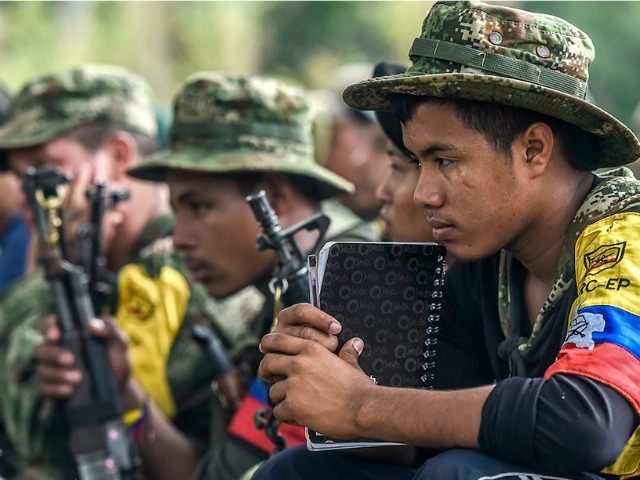The President of Colombia, Juan Manuel Santos, and the leadership of the Revolutionary Armed Forces of Colombia (FARC) have confirmed that the two will not sign a peace deal on March 23 that would have allowed FARC leaders to return to Colombia as previously planned.
The Marxist terror group’s leadership is currently enjoying safe haven in Cuba thanks to the generosity of the Castro regime. FARC peace negotiator “Joaquín Gómez” announced in Havana Friday that the group agrees with Santos’ negotiators that more issues need to be discussed before reaching an agreement. “We think President Santos has acted with objectivity and we agree with what he said, and we think that yes, after the 23rd we can have an agreement,” he told reporters.
President Santos said Thursday that he was looking to “find another date” for signing the peace agreement. “I am not going to abide by the date with a bad agreement,” he asserted, “After all this effort, all this time, if we haven’t reached a good deal by the 23rd, I’ll propose to the other side to create another deadline.”
President Santos had announced to the world at the annual United Nations General Assembly meeting last September that talks with the FARC leadership had been a success and could be used as a model to bring terrorist groups into the political fold of their respective nations across the world. He insists still that the deal will require a national referendum, warning legal experts that such a democratic endeavor is non-negotiable.
The deal announced in September before Santos’s speech would allow most members of the FARC terror organization to identify themselves to the federal government without having to serve time in prison. Only those found guilty of “crimes against humanity,” rather than “political crimes,” would have to spend time in prison; others would have to participate in community service activities like removing land mines from villages previously occupied by the FARC. Santos promised not to extradite FARC leaders to other countries where they may face charges, like the United States.
Following the announcement that talks would continue past the established date, audio has surfaced of FARC leaders pessimistically discussing negotiations with the Colombian government. While Colombia’s RCN television station notes the audio has yet to be confirmed to be authentic, it is making the rounds. Negotiators are heard complaining that Santos’s government had been pressuring them to agree to sign the deal before the 23rd to correspond with President Barack Obama’s visit to Havana, scheduled for March 21-22. President Obama removed Cuba from the State Sponsors of Terrorism list last year despite its open ties to FARC leadership, among other terrorist organizations.
In addition to the audio surfacing on news media, FARC spokesmen had made official statements questioning whether a deal was possible. In November, spokesman Iván Márquez issued a statement in which the group objected to the referendum so pivotal to Santos: “What is the point of wasting time on a plebiscite project that, on the one hand, was not approved by the Havana round table and, on the other, it is known beforehand that its legal reach impedes it from approving the necessary themes to implement the final agreement?”
By January, Gómez was calling the March 23 date “naive and lightweight.” “We are doing the impossible, but there are causes or objective facts that will surely impede that this will happen on the 23rd… there are very important pitfalls, such as the clarification and dismantling of our paramilitary,” he added.
The FARC is the world’s wealthiest non-jihadist terrorist organization and is estimated to have killed at least 220,000 people in the past half century. It remains active in drug trafficking throughout the Americas, as a Colombian government report asserted Friday. FARC leaders still in Colombia lure poor farmers into drug trafficking by giving them “false hopes,” such as falsely claiming the government will invest in the land through infrastructure of social justice projects once it is prepared for cultivating coca leaf. A Colombian official described this fraud as “highly inconvenient” for the government.

COMMENTS
Please let us know if you're having issues with commenting.